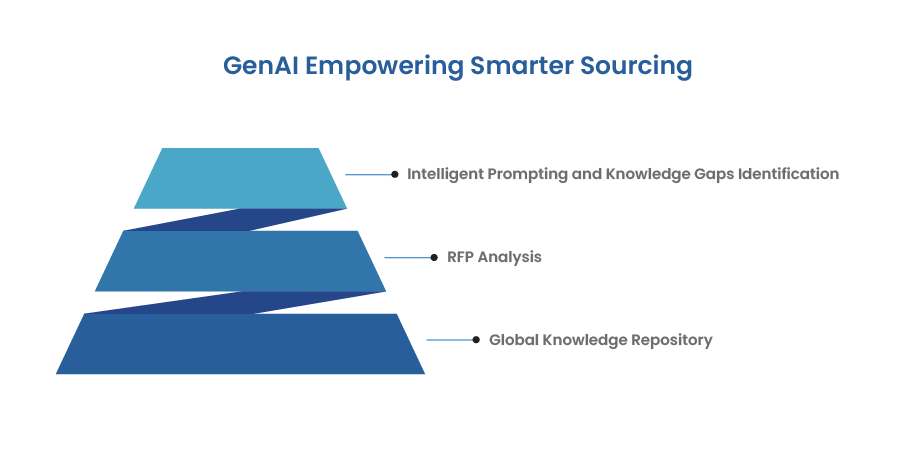Imagine navigating a bustling marketplace, overwhelmed by options. Selecting the perfect vendor requires careful evaluation. In the realm of procurement, that’s where RFI, RFQ, and RFP documents come in – your essential tools for finding the ideal business partner. This comprehensive guide to RFI RFQ and RFP empowering both sourcing specialists and salespeople to navigate these crucial documents effectively. We’ll delve into their purposes, limitations, and ideal use cases. Plus, we’ll explore how cutting-edge Generative AI (GenAI) can revolutionize the entire process, propelling you towards smarter sourcing decisions.
Understanding the Sourcing Trinity: RFI vs. RFQ vs. RFP
Round 1: RFI (Request for Information) – Gathering Market Intelligence
An RFI is your initial reconnaissance mission. Used in the early stages of sourcing, it gathers general information about potential suppliers’ capabilities. Think of it as casting a wide net to understand the market landscape before diving deeper.
Sourcing Specialist’s Playbook:
- Craft clear, concise questions: Target key areas like product offerings, service expertise, and past experiences.
- Cast a wider net: Send the RFI to a larger pool of vendors to identify new players and compare offerings.
Read more: Comprehensive Guide to Strategic Sourcing
Salesperson’s Side:
- Respond promptly and comprehensively: Highlight relevant experience and showcase your company’s strengths.
- Understand project scope: Use the RFI as an opportunity to tailor future interactions.
Limitations:
- Non-binding: RFIs don’t guarantee a future partnership.
- Limited detail: Responses might lack specifics for shortlisting vendors at this stage.
When to Use an RFI:
- Uncertain about specific project requirements.
- Identifying new and innovative vendors.
- Need a high-level understanding of a supplier’s capabilities.
Example: A restaurant chain considering revamping its kitchen might issue an RFI to various equipment suppliers, gauging their expertise in energy-efficient options and custom installation services.
Read more: Transforming procurement requests with GenAI
Round 2: RFQ (Request for Quote) – The Price Showdown
The RFQ is all about getting down to business. It’s a formal document outlining your specific needs and requesting detailed pricing information from shortlisted vendors.
Sourcing Specialist’s Playbook:
- Define exact specifications: Clearly define the exact specifications of the good or service you require.
- Include details: Quantities, delivery timelines, desired payment terms.
- Standardize format: Ensure easy comparison of vendor quotes.
Salesperson’s Side:
- Analyze meticulously: Ensure your quote precisely meets the specified requirements.
- Competitive pricing: Be competitive with pricing while considering profit margins.
- Highlight value-added services: Showcase any additional services you offer.
Limitations:
- Focuses on lowest price: May compromise quality or innovation.
- Not ideal for complex projects: Doesn’t consider multifaceted considerations.
When to Use an RFQ:
- Clear understanding of specific needs and specifications.
- Price is the primary selection criterion.
- Sourcing commoditized or standardized goods or services.
Example: A company seeking office supplies might issue an RFQ to stationery suppliers, requesting quotes for a specific quantity of printer cartridges and paper reams at a specific delivery time.
Round 3: RFP (Request for Proposal) – The All-Encompassing Battle
The RFP is the heavyweight champion of sourcing documents. It’s used for complex projects where a holistic understanding of the vendor’s approach is crucial.
Sourcing Specialist’s Playbook:
- Comprehensive overview: Provide a comprehensive overview of the project scope and desired outcomes.
- Evaluation criteria: Include evaluation criteria beyond just price, encompassing factors like experience, innovation, and risk mitigation strategies.
- Weighted scoring system: Consider using a weighted scoring system to objectively evaluate proposals.
Salesperson’s Side:
- Showcase expertise and creativity: Go beyond simply meeting the requirements – propose innovative solutions and demonstrate the value you bring.
- Outline project plan: Clearly outline your project timeline, milestones, and team composition.
- Prepare for follow-up: Be prepared to answer follow-up questions and participate in presentations or negotiations.
Limitations:
- Time-consuming: Creating and evaluating RFPs requires significant resources.
- Not suitable for simple projects: Not ideal for straightforward needs.
When to Use an RFP:
- Undertaking a complex project with multifaceted requirements.
- Evaluating factors beyond price is critical.
- Encouraging creative solutions and innovation from potential vendors.
Example: A manufacturing company considering a new production line might issue an RFP to automation solution providers. The RFP would detail desired production goals, space constraints, and budget considerations. Vendors would then respond with proposals outlining their equipment recommendations, implementation plans, and potential cost savings.
The Generative AI Revolution: Supercharging Your Sourcing Game
The traditional RFI-RFQ-RFP process can be cumbersome and time-consuming. But what if there was a way to streamline it and gain deeper insights? Enter Generative AI (GenAI), a transformative technology poised to revolutionize the sourcing landscape.
Read more: Transform RFx Management: Go Smarter, Faster with AI
GenAI in Action: Empowering Smarter Sourcing
- Automated Document Creation: Say goodbye to repetitive tasks! GenAI can automatically generate tailored RFI, RFQ, and RFP documents based on your project specifics. Imagine creating a comprehensive RFP in a fraction of the time, freeing you to focus on strategic initiatives.
- GenAI: Beyond Efficiency – Unleashing Expertise in Automated Document Creation: While time savings are undeniable, GenAI’s impact on automated document creation goes far beyond simply speeding up the process. When dealing with complex categories like enterprise software, specialized IT equipment, or MRO (Maintenance, Repair, and Operations) services, crafting a comprehensive and effective RFP traditionally requires a significant investment of time and expertise. Often, a team of senior leaders with deep category knowledge, subject matter understanding, and business use case familiarity come together to collaborate on this crucial document.
Explore Zycus’ Generative AI Platform to transform your Source to Pay Process
This is where GenAI shines. It acts as an intelligent assistant, augmenting human expertise and streamlining the RFP creation process. Here’s how:
- Global Knowledge Repository:GenAI can access and analyze a vast repository of industry knowledge. This includes best practices, market trends, and insights into specific product categories. This wealth of information informs the RFP creation process, ensuring it reflects current industry standards and addresses relevant considerations.
- Past RFP Analysis:Imagine having access to a library of past RFPs from your company or even industry benchmarks. GenAI can analyze these documents, extracting key elements, successful structures, and effective language. This knowledge is then used to build a stronger foundation for your new RFP, ensuring it captures all critical information without reinventing the wheel.
- Intelligent Prompting and Knowledge Gaps Identification:GenAI doesn’t replace human expertise; it amplifies it. As you draft the RFP, GenAI can act as an intelligent prompt, suggesting relevant sub-sections, essential questions, and industry-specific considerations based on your chosen category. Additionally, GenAI can identify potential knowledge gaps in the RFP by analyzing its content against its vast knowledge base. This allows you to focus on areas requiring your specific expertise or external consultation.
The Benefits: Streamlined Process, Deeper Expertise
By leveraging GenAI for automated document creation, businesses can experience several key benefits:- Reduced Reliance on Subject Matter Experts:While senior leadership involvement remains valuable, GenAI alleviates the burden of crafting the entire RFP from scratch. This frees up time for strategic decision-making and collaboration on broader project aspects.
- Enhanced RFP Quality:The combination of human expertise and AI-powered insights leads to the creation of more comprehensive and effective RFPs. By incorporating best practices, relevant industry knowledge, and past successes, GenAI ensures your RFP captures all essential details and attracts the most qualified vendors.
- Standardization and Consistency:GenAI can help establish a standardized format for RFPs within a specific category. This ensures consistency across projects, simplifies evaluation processes, and reduces the risk of overlooking crucial information.
- Reduced Costs:By streamlining the RFP creation process and potentially reducing reliance on external consultants, GenAI can contribute to significant cost savings.
- Intelligent Vendor Shortlisting: Leverage the power of AI algorithms to identify the most promising vendors. GenAI can analyze RFI responses and past performance data to shortlist vendors who best align with your needs, saving you valuable time and effort.
- Data-Driven Analysis: Unlock the power of data! GenAI can analyze and compare vast amounts of data from proposals, helping you identify hidden trends and optimize vendor selection. Gain a deeper understanding of proposed solutions and identify potential risks or opportunities.
- Predictive Analytics: See into the future (well, sort of)! Utilize AI to predict potential risks and opportunities associated with different vendors. GenAI can analyze historical data to identify potential issues like supply chain disruptions or project delays, allowing you to make more informed decisions.
The Benefits of GenAI for Sourcing Specialists and Salespeople
Sourcing Specialists:
- Reduced Time and Effort: Spend less time on document creation and data analysis, freeing up resources for strategic tasks like supplier relationship management.
- Improved Decision-Making: Gain data-driven insights to make more informed vendor selection choices, leading to better project outcomes.
- Enhanced Risk Management: Identify potential risks associated with vendors early on in the process, allowing for proactive mitigation strategies.
Salespeople:
- Targeted Communication: Tailor proposals to better align with the specific needs identified through AI analysis. Highlight your strengths and value propositions in a way that resonates with the buyer.
- Stand Out from the Crowd: Leverage AI-generated insights to identify unique selling points and craft proposals that stand out from the competition.
- Faster Response Times: Utilize automation tools to expedite proposal creation and submission, ensuring you meet deadlines and stay ahead of the curve.
The Future of Sourcing is Intelligent
The landscape of sourcing is rapidly evolving. By embracing GenAI, businesses can unlock a new level of efficiency, gain deeper insights, and make smarter sourcing decisions. As AI continues to develop, the future of RFI, RFQ, and RFP processes is bright, promising a more streamlined, data-driven, and intelligent approach to vendor selection.
In Conclusion
Understanding the nuances of RFI, RFQ, and RFP is crucial for both sourcing specialists and salespeople navigating the world of procurement. By selecting the right tool for the job and leveraging the power of GenAI, businesses can optimize their sourcing strategies, forge stronger vendor relationships, and ultimately achieve greater success.
Ready to take your sourcing game to the next level? Try out Zycus’ Strategic Sourcing Software today
Related Reads:
- Comprehensive Guide to Strategic Sourcing
- How eSourcing Automation Streamlines Processes
- Brochure: Request Management
- Purchasing Request vs Purchase Order: Demystifying the Procurement Process
- 5 Ways AI is Revolutionizing Purchase Request Processing
- Understanding the What, Why, & How of Strategic Sourcing
- Analyst Report: The Four Pillars of Sourcing Success
- White Paper: Unlocking Efficiency: A Guide to the Basics of Strategic Sourcing
- White Paper: A Practical Handbook for Tackling Key Sourcing Challenges in Procurement






































